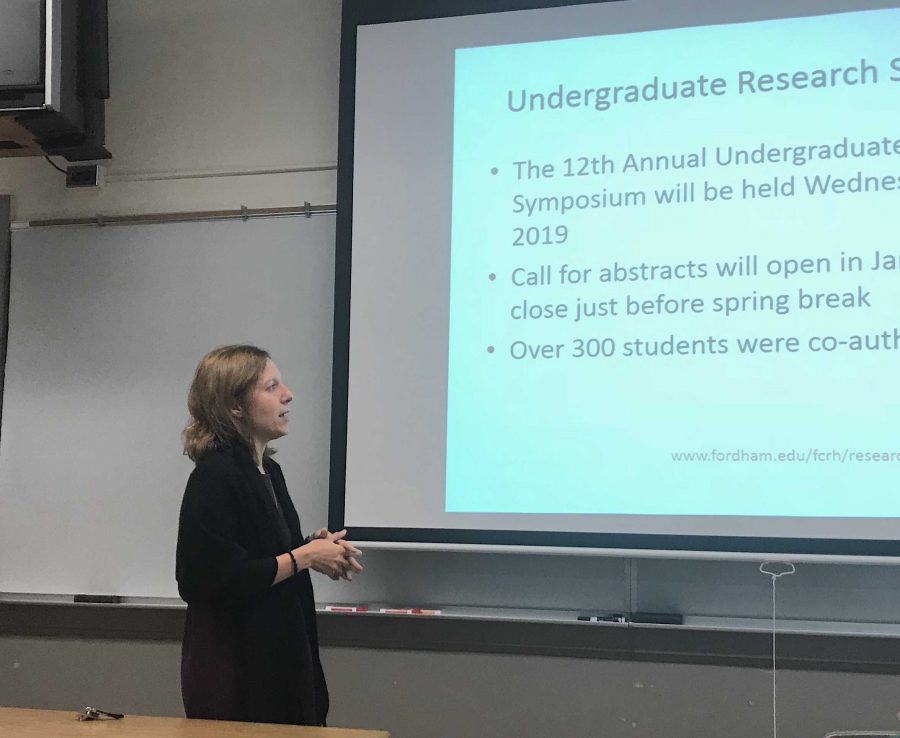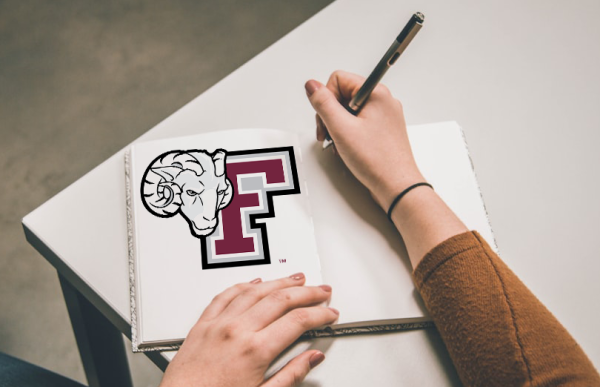Undergraduate Research Course Strives to Make Research Opportunities Available
By Julia Rist
Fordham students had the chance to attend “Getting Involved in Undergraduate Research,” an informational meeting about how to become more involved in research on campus.
A variety of major departments were represented in the informational meeting. Some students in attendance are majoring in fields that are no stranger to research, such as biology and integrative neuroscience. Other students came from less research-oriented major departments, like art history.
Shannon Zipfel, FCRH ’21, is an art history major. Zipfel came to the session to get more information about the possibility of pursuing a research project for the spring semester.
“I’m just here to figure out how to get involved about doing research,” Zipfel said. “I don’t have an exact idea formed yet. I’m interested in Islamic art and the funerary temples that they designed in ancient times.”
Olivia Doll, an integrative neuroscience major, also plans on pursuing a research project. Doll, FCRH ’21, said she plans to conduct her research on cellular neuroscience. Doll said she hopes her future research will help her with her post-graduation aspirations.
“I’d like to go to medical school,” Doll said. “I’m not sure about what kind of doctor I want to be yet, but I’m interested in working with the brain.”
Rachel Annunziato, the associate dean for strategic initiatives at FCRH, is in charge of undergraduate research at the Fordham College of Rose Hill.
Annunziato, an associate professor in the Psychology Department, said that doing research at the undergraduate level can give Fordham students a number of advantages after they graduate from college.
“Many of you may be thinking about careers where undergraduate research would be expected for you to have some involvement in while you’re an undergraduate,” Annunziato said. “But, even when it’s not an expectation, this is a set of experiences that can be really crucial to your future direction.”
Annunziato also said that conducting research at Fordham fosters a sense of community among student researchers.
“Undergraduate research at FCRH is a community in itself,” she said. “We have a lot of activities and ways to get to know people. In some areas, like art history and history, research is more independent, but nonetheless, you get to know the other researchers and connect with people who have similar interests.”
According to Annunziato, research at Fordham is not just simple data entry tasks. Fordham undergraduates have the opportunity to get their name on publications and go to research conferences where they can present their work.
“You are trusted with high-level work, and you can be heavily involved in a project. It could be life-changing,” Annunziato said.
Annunziato said that the mentorship aspect of research at Fordham can be extremely beneficial for many students. She said that if students are planning to join a lab group or a faculty-led project, they should make sure they know how much time they will be getting with the faculty member.
“I know that in some labs here, things are largely run by graduate students, which can be great,” said Annunziato. “They’re so close to where you are and they remember what it’s like. You do want some time with the mentor as well.”
Annunziato said that the Office of Undergraduate Research receives millions of dollars from donors, so that Fordham undergraduates can pursue their research projects.
Annunziato outlined how a student would be able to receive various types of research grants. These grants are open to all FCRH students to apply. During the semester, the grant is capped at $1,600, but if a student decides to pursue a summer research project, they may be eligible for a grant of up to $4,000.
These grants can be applied to students conducting their research independently or working alongside a Fordham faculty member.
After a student submits their research proposal, their outline is reviewed by a team of 40 faculty members.
The deadline for the spring semester research grants is Nov. 15.
Annunziato also teaches a class in the spring semester called “Foundations in Research Engagement.” The class is aimed at building the groundwork of basic research skills, so that students can pursue research projects on campus. Annunziato said she decided to add this class to the course list because some students have trouble getting started in their research pursuits.
“I have heard from some students that they just can’t find the research experience here, which is so upsetting to me,” said Annunziato. “I want this to be a place where everybody can do research.”
Annunziato said one of the main reasons for this course is to make sure that every student who is interested in pursuing research projects at Fordham has the ability to do so.















































































































































































































